

UN Water Video. MackinVIA. Water Is Important To Life. Water is Life - Water stress. Today, one of the largest concerns around the world iis the lack of freshwater for drinking and cooking.
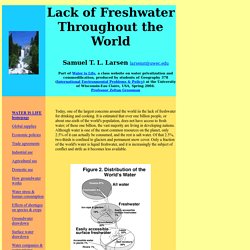
It is estimated that over one billion people, or about one-sixth of the world's population, does not have access to fresh water; of these one billion, the vast majority are living in developing nations. Although water is one of the most common resources on the planet, only 2.5% of it can actually be consumed, and the rest is salt water. Of that 2.5%, two-thirds is confined to glaciers and permanent snow cover. Only a fraction of the world's water is liquid freshwater, and it is increasingly the subject of conflict and strife as it becomes less available. Figure 1. Population Growth The world's population is growing at a rate of 80 million people each year. 1 Water - its importance and source. 1.1 The importance of water Water is one of the most important substances on earth.
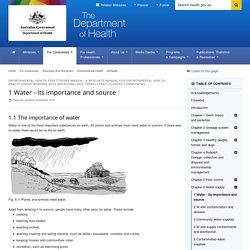
All plants and animals must have water to survive. If there was no water there would be no life on earth. Fig. 6.1: Plants and animals need water. Apart from drinking it to survive, people have many other uses for water. Freshwater Stories From National Geographic: Water Conservation and Pollution. Daily NewsIs This the World’s Largest Freshwater Fish?
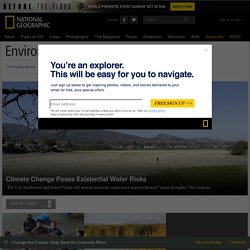
A giant freshwater stingray caught and released in Thailand provides new insight on threatened species. 6 Ways to Save the Salton Sea and Colorado Delta Both ecosystems are critical freshwater sources for humans and wildlife. Water CurrentsEpic California Drought The good news is that new methods of monitoring water from space work very well. The bad news is that we are running out of it. India’s Food Security Threatened by Groundwater Depletion Mining groundwater would unleash painful social and economic consequences for a nation of 1.25 billion people. Daily NewsSaving the Colorado River Delta, One Habitat at a Time A trickle of water is being returned to a few parts of the dried-out delta-and those parts are blooming.
Water. Facts: Water. Water 1 in 10 people lack access to safe water Sanitation 1 in 3 people lack access to a toilet.
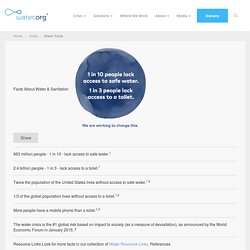
Issues › Water. Health and Sanitation Diseases from unsafe water and lack of basic sanitation kill more people every year than all forms of violence, including war.
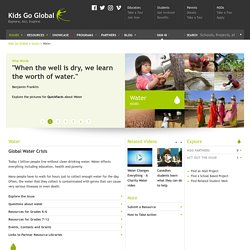
Children are especially vulnerable, as their bodies aren't strong enough to fight diarrhea, dysentery and other illnesses. With basic education about proper sanitation, such as hand-washing and the use of latrines, many fatal diseases can be avoided. Women and Children The work of collecting water usually falls to the women and children of the family.
The time that is spent walking to collect water is not only a dangerous time for them, but is also time that is not spent learning to read and write, making an income, or caring for the younger children in the family. Poverty. The World Water Crisis. The Coming Global Water Crisis - (Documentary, HD) Lack of water and inadequate sanitation. The Last Drop NG April 2010 Download this article - it's very good! Oxfam Water Challenge. What is it?
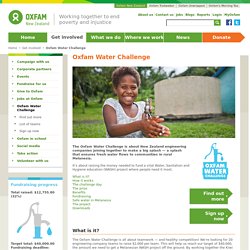
The Oxfam Water Challenge is all about teamwork — and healthy competition! We‘re looking for 20 engineering company teams to raise $2,000 per team. This will help us reach our target of $40,000, the amount we need to get a Melanesian WASH project off the ground. By working together the Kiwi water sector can make a real difference to the lives of communities that are forced to drink dirty water every day. How it works We want companies both large and small to dive in deep. The challenge day The Oxfam Water Challenge day will bring together workmates to design, build, present and deconstruct a solution to our challenge.
The challenge will be based on a water problem/scenario, with design, engineering and pitching/presenting skills needed. The prize There will be two winners! The team on the day with the best performance and the most points will win a hamper full of awesome prizes and vouchers (meals out, adventure sports, cinema passes and much more!) Benefits Fundraising. Helping Children Survive & Thrive. Click images to enlarge Clean water is collected from a hand pump, for drinking and washing.
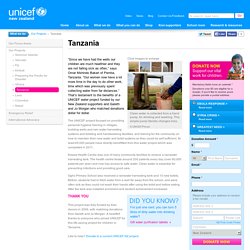
This simple pump literally changes lives. © UNICEF/Pirozzi “Since we have had the wells our children are much healthier and they are not falling sick as often,” says Omar Mshindo Bakari of Pemba, Tanzania. “Our women now have a lot more time in the day to do other work, time which was previously spent collecting water from far distances.” Water.
The International Decade for Action: Water for Life 2005-2015. Water for Life - Safe Water for the World. The WaterLife Foundation ...relentless pursuit of healthy water. Clean Water for All. 5 Global Kids' Health Issues Huge progress has been made in many critical areas involving children's health.
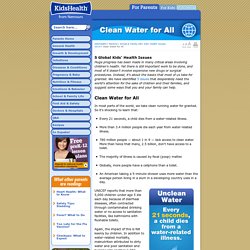
Yet there is still important work to be done, and most of it doesn't involve expensive new drugs or surgical procedures. Instead, it's about the basics that most of us take for granted. We have identified 5 issues that desperately need the world's attention for the sake of children and their families, and suggest some ways that you and your family can help. In most parts of the world, we take clean running water for granted. Every 21 seconds, a child dies from a water-related illness. UNICEF reports that more than 5,000 children under age 5 die each day because of diarrheal diseases, often contracted through contaminated drinking water or no access to sanitation facilities, like bathrooms with flushable toilets. Again, the impact of this is felt keenly by children. This cycle of disease, joblessness, and missed school makes the water crisis a major part of global poverty.
- The World's Water. WATER IS LIFE. Why Water - Access to clean, safe water in Africa. International Decade for Action 'Water for Life' 2005-2015. How Seawater Desalination Works. "Drinking from the sea", explore how and why sea water is desalinated (motion design) Water Shortage in the World. US – Sustainability Originating from rain or snow, available precipitation refers to water that is actually usable.
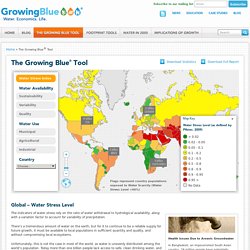
Today, many of the United States’ fresh water aquifers are either stressed or negatively impacted by over pumping. Still, others are impacted by intrusion from salt water. As an example, in Houston, extensive pumpage of ground water to support economic and population growth has caused water level declines of approximately 400 feet and resulted in subsidence. The country’s growth depends on using its water resources in sustainable ways – ways that preserve a supply necessary for sustaining quality of life, economic investment and ecosystem health. On the whole, sustainable water management involves meeting the needs of today’s population while taking into account the needs of future generations.
The more we use water, the more we influence its quality. On a local level, water cycles are also influenced by the way we plan our cities. Major Bodies of Water - World Oceans Seas Gulfs, Rivers and Lakes Maps, Bays Straits. Life Expectancy, Food and Hunger, Access to Safe Water, AIDS, Population, and Human Conditions - Earth Web Site. World Life Expectancy Map Access to Safe Water Map "More than five million people, most of them children, die every year from illnesses caused by drinking poor quality water.
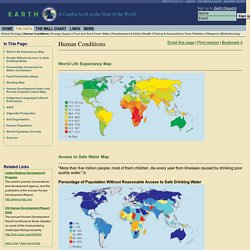
" b Percentage of Population Without Reasonable Access to Safe Drinking Water Reasonable access to safe drinking water is defined as the availability of at least 20 litres per person per day from an improved source within 1 kilometer of the user's dwelling. 2 billion people have no access to electricity at all.a.